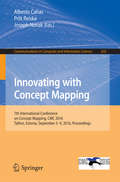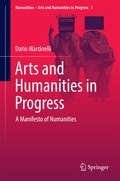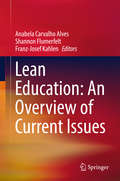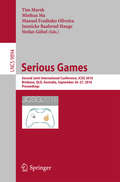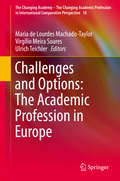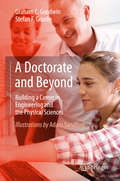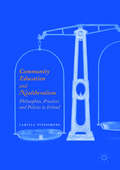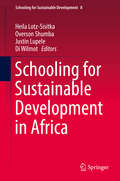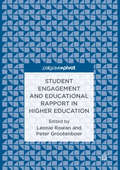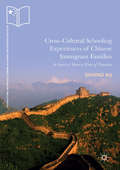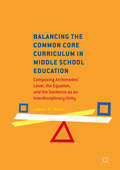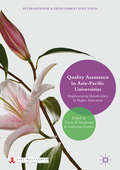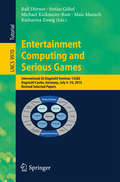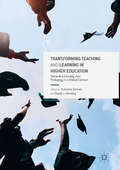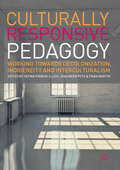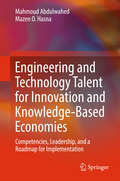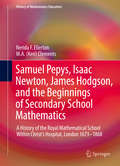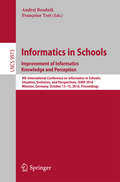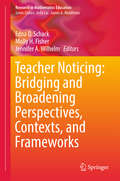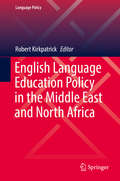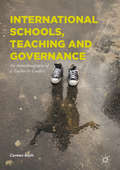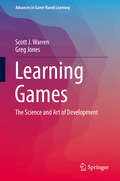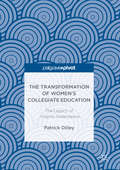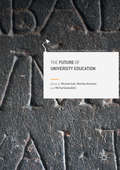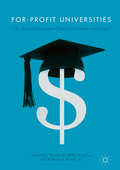- Table View
- List View
Innovating with Concept Mapping
by Alberto Cañas Priit Reiska Joseph NovakThis book constitutes the refereed proceedings of the 7th International Conference on Concept Mapping, CMC 2016, held in Tallinn, Estonia, in September 2016. The 25 revised full papers presented were carefully reviewed and selected from 135 submissions. The papers address issues such as facilitation of learning; eliciting, capturing, archiving, and using expert knowledge; planning instruction; assessment of deep understandings; research planning; collaborative knowledge modeling; creation of knowledge portfolios; curriculum design; eLearning, and administrative and strategic planning and monitoring. "
Arts and Humanities in Progress: A Manifesto of Numanities (Numanities - Arts and Humanities in Progress #1)
by Dario MartinelliThe book aims to introduce a research concept called "Numanities", as one possible attempt to overcome the current scientific, social and institutional crisis of the humanities. Such crisis involves their impact on, and role within, society; their popularity among students and scholars; and their identity as producers and promoters of knowledge. The modern western world and its economic policies have been identified as the strongest cause of such a crisis. Creating the conditions for, but in fact encouraging it. However, a self-critical assessment of the situation is called for. Our primary fault as humanists was that of stubbornly thinking that the world's changes could never really affect us, as - we felt - our identity was sacred. In the light of these approaches, the main strengths of humanities have been identified in the ability to: promote critical thinking and analytical reasoning; provide knowledge and understanding of democracy and social justice; develop leadership, cultural and ethical values. The main problems of humanities are the lack economic relevance; the socio-institutional perception of them as "impractical" and unemployable; the fact that they do not match with technological development. Finally, the resulting crisis consists mainly in the absence (or radical reduction) of funding from institutions; a decrease in student numbers a decrease in interest; a loss of centrality in society. A Numanities (New Humanities) project should consider all these aspects, with self-critical assessment on the first line. The goal is to unify the various fields, approaches and also potentials of the humanities in the context, dynamics and problems of current societies, and in an attempt to overcome the above-described crisis. Numanities are introduced not as a theoretical paradigm, but in terms of an "umbrella-concept" that has no specific scientific content in it: that particularly means that the many existing new fields and research trends that are addressing the same problems (post-humanism, transhumanism, transformational humanities, etc. ) are not competitors of Numanities, but rather possible ways to them. Therefore, more than a theoretical program, Numanities intend to pursue a mission, and that is summarized in a seven-point manifesto. In the light of these premises and reflections, the book then proceeds to identify the areas of inquiry that Numanities, in their functions and comprehensive approach, seek to cover. The following list should also be understood as a statement of purposes for this entire book series. These, in other words, will be the topics/areas we intend to represent. Once elaborated on the foundations of Numanities, the book features a second part that presents two case studies based on two relatively recent (and now updated) investigations that the author has performed in the fields of musical and animal studies respectively. The two cases (and relative areas of inquiry) were selected because they were considered particularly relevant within the discussion of Numanities, and in two different ways. In the first case-study the author discussed the most typical result (or perhaps cause?) of the technophobic attitude that was addressed in the first part of the book: the issue of "authenticity", as applied, in the author's particular study, to popular music. In the second case-study, he analyzes two different forms of comparative analysis between human and non-human cognition: like in the former case, this study, too, is aimed at a critical commentary on (what the author considers) redundant biases in current humanistic research - anthropocentrism and speciesism.
Lean Education: An Overview of Current Issues
by Franz-Josef Kahlen Shannon Flumerfelt Anabela Carvalho AlvesThis edited volume presents a structured approach to a new lean education curriculum, implemented for the education of engineers, managers, administrators as well as human resources developers. The authorship comprises professors and lecturers, trainers and practitioners who educate future professionals in Lean Thinking principles and tools. This edited book provides a platform for authors to share their efforts in building a Body of Knowledge (BoK) for Lean Education. The topical spectrum is state-of-the-art in this field, but the book also includes a glimpse into future developments. This is a highly informative and carefully presented book, providing valuable insight for scholars with an interest in Lean Education.
Serious Games
by Minhua Ma Tim Marsh Stefan Göbel Manuel Fradinho Oliveira Jannicke Baalsrud HaugeThe recent re-emergence of serious games as a branch of video games and as a promising frontier of education has introduced the concept of games designed for a serious purpose other than pure entertainment. To date the major applications of serious games include education and training, engineering, medicine and healthcare, military applications, city planning, production, crisis response, to name just a few. If utilised alongside, or combined with conventional training and educational approaches, serious games could provide a more powerful means of knowledge transfer in almost every application domain. Serious Games and Edutainment Applications offers an insightful introduction to the development and applications of games technologies in educational settings. It includes cutting-edge academic research and industry updates that will inform readers of current and future advances in the area. The book is suitable for both researchers and educators who are interested in using games for educational purposes, as well as game professionals requiring a thorough understanding of issues involved in the application of video games technology into educational settings. It is also applicable to programmers, game artists, and management contemplating or involved in the development of serious games for educational or training purposes.
Challenges and Options: The Academic Profession in Europe (The Changing Academy – The Changing Academic Profession in International Comparative Perspective #18)
by Ulrich Teichler Maria de Lourdes Machado-Taylor Virgílio Meira SoaresThis volume explores the various issues that have an impact on the academic career of professionals in European higher education. Higher Education Institutions (HEIs) are currently subject to profound uncertainties and are more challenged than ever on quality issues, both with regard to their conceptual nature and in the extension and amendment of their mission. Divided into three parts, the first part of the book deals with the challenges and issues in higher education academic careers. It addresses such topics as the influence of European policies and changes, the cultural differences in the preferences of academics for teaching or research, the increasing inequality in working conditions for academics, and the changing nature of academic strategy in the transformational world of higher education with its implications for academic structures, work and careers. The second part of the book analyses the findings of a national study on satisfaction of academics in Portuguese higher education, carried out at the Centre for Research on Higher Education Policies (CIPES). The third part offers a comparative analysis of a number of national European case studies, focusing on the changing relevance of and increasing expectations around academic careers. The concluding chapter discusses whether the academic profession is merely an artificial term that has to do with a heterogeneous range of occupations, or if there are important common elements of the academic profession across European Higher Education systems.
A Doctorate and Beyond: Building a Career in Engineering and the Physical Sciences
by Graham C. Goodwin Stefan F. GraebeA book that takes you through and beyond your doctoral studies. It will be a valuable reference throughout your working life. Drawing on their own extensive experience, the authors pass on invaluable advice by answering such questions as: Do I want to do a doctorate? How should I choose which doctorate and where to study? How do I achieve my doctorate? What career opportunities exist once I've completed my doctorate? What is the role of networking, leadership and reputation in building my career? How do I go about mentoring the next generation? What do I do when things don't go to plan? This practical guide helps you to determine your best answer to all these questions and more. The authors not only discuss how to become a success but also how to keep success going, beginning with the choice to do a doctorate (or not) and what to expect, through how to get the best from student-supervisor interaction, the value of networking, the process of publication, how to choose between a career in academia or industry, while achieving work-life balance. The authors' own thoughts are enriched by the life experiences of many colleagues and prominent individuals who have achieved success and recognition: the book contains inspirational quotes from established figures in academia and industry. They reflect on career options, what leads to a successful career, and how to make conscious career choices instead of letting things happen and hoping for the best. This ranges from avoiding common pitfalls--such as squandering your reputation--to developing that all-important energy: your personal passion. A Doctorate and Beyond will be an extra difference in making the most of the best times and will support you when the going gets tough. If you are contemplating doctoral studies in engineering or the physical sciences, or have a doctorate and are seeking career guidance, this book will change the way you think about life. For further discussion and information about the book please see the blog/forum hosted by the authors at http://adoctorateandbeyond. com/
Community Education and Neoliberalism: Philosophies, Practices and Policies in Ireland
by Camilla FitzsimonsThis book explores community education in Ireland and argues that neoliberalism has had a profound effect on community education. Rather than retain its foundational characteristics of collective, equality-led principles and practices, community education has lost much of its independence and has been reshaped into spaces characterised by labour-market activation, vocationalisation and marketisation. These changes have often, though not always, run contrary to the wishes of those involved in community education creating enormous tensions for practitioners, course providers and participants.
Schooling for Sustainable Development in Africa
by Heila Lotz-Sisitka Overson Shumba Justin Lupele Di WilmotThis book considers the scope and dynamics of Education for Sustainable Development (ESD) and learning in schools in Africa. It explores the conditions and processes that support such learning, and examines how ESD in schooling can improve the quality and relevance of education. The quality of education has been defined internationally as a key concern for educational institutions around the world, including schools in Africa. The models of quality are often limited to performance-based approaches and/or inclusive approaches. The contributions in this book show that there is more to a discussion on educational quality in Africa than performance success and/or inclusion. The chapters explain how ESD brings a new relevance to education in Africa, and at the same time, sounds the beginning of a new concept of quality education. The volume presents a collection of experiences in creating and supporting quality learning processes through a variety of ESD practices.
Student Engagement and Educational Rapport in Higher Education
by Peter Grootenboer Leonie RowanThis book outlines a range of innovative methods to gather student feedback, and explores the complex relation between student engagement, student satisfaction, and student success. Drawing on results from a set of numerous case-studies carried out at a school of education, the book reports on a range of theoretically-informed teaching innovations, including focus groups, learning analytics data, collegial conversations and insights from student researchers, that have been designed to create respectful, student-centred, and engaging learning environments. In the current climate of ever-increasing pressure on delivering high student satisfaction rates, these results are invaluable for university students and teachers across the globe. With its unique thematic focus on educational rapport and relationship-centred education, the book is an excellent reference point for staff with a commitment to the scholarship of learning and teaching. It will be of great interest to students, practitioners, teachers and policy makers in higher education.
Cross-Cultural Schooling Experiences of Chinese Immigrant Families: In Search of Home in Times of Transition (Intercultural Reciprocal Learning in Chinese and Western Education)
by Shijing XuThis book introduces the concept of reciprocal educational learning among cultures with very different historical and philosophical origins. The concept of reciprocal learning grows out of a four year study of immigrant Chinese family narrative experiences in a Western context. This book captures the lived moments of such transitional lives both in and out of school settings to demonstrate why a child would appear and disappear from different caregivers' purview. Through the narrative lens of student and family life, the study illustrates the intersection of Confucian and Western philosophies of education and how their interaction creates complications as well as benefits for both traditions, hence, the idea of reciprocal learning.
Balancing the Common Core Curriculum in Middle School Education: Composing Archimedes' Lever, the Equation, and the Sentence as an Interdisciplinary Unity
by James H. BunnThis book examines the idea of 'good education' which is thought to include a scientific and technical component, a mathematical component, a writing component, and an ethical and aesthetic component. Often taught separately in schools and in the Common Core Curriculum, Bunn proposes a new three-way intersection in these teachings: the basic sciences and mechanics of levering on a seesaw, the basic formulations of patterning an algebraic equation, and the basic rules for writing a sentence in English. In all three forms of inquiry, balance is the mainstay through which problems in US middle school education are brought together and analyzed.
Quality Assurance in Asia-Pacific Universities
by Deane E. Neubauer Catherine GomesThis edited volume examines the importance of quality issues in contemporary higher education systems in the Asia Pacific. Part One foregrounds relevant discussions of 'quality' within today's globalized, interconnected, and complex higher education systems while Part Two focuses on selected universities in the Asia Pacific region. Chapter contributors discuss how quality issues and quality assurance mechanisms are implemented in their situation-specific systems. Part Three extends the research of higher education quality assurance in Hawaii Pacific University (HPU) and the diverse international student body in the Australian higher education system. The conclusion chapter discusses a typology of methods used by higher education systems in establishing effective quality assurance mechanisms.
Entertainment Computing and Serious Games
by Michael Kickmeier-Rust Katharina Zweig Ralf Dörner Stefan Göbel Maic MasuchThe aim of this book is to collect and to cluster research areas in the field of serious games and entertainment computing. It provides an introduction and gives guidance for the next generation of researchers in this field. The 18 papers presented in this volume, together with an introduction, are the outcome of a GI-Dagstuhl seminar which was held at Schlo#65533; Dagstuhl in July 2015.
Transforming Teaching and Learning in Higher Education
by Ruksana Osman David J HornsbyUniversities face the prospect of becoming redundant unless the way teaching and learning takes place changes. This book explores the idea of transformation and pedagogy, In particular, it will highlight how universities are transformed through a set of pedagogical interventions and stances that integrate a sense of moral and ethical purpose to learning. Actively integrating cultural pluralism in developing knowledge and understanding aspires to liberate the learner from existing power structures by fostering a desire to challenge and change the social system in which we live and connects the reality around us and its many problems to the knowledge generation process.
Culturally Responsive Pedagogy: Working towards Decolonization, Indigeneity and Interculturalism
by Fran Martin Fatima Pirbhai-Illich Shauneen PeteThis book convincingly argues that effective culturally responsive pedagogies require teachers to firstly undertake a critical deconstruction of Self in relation to and with the Other; and secondly, to take into account how power affects the socio-political, cultural and historical contexts in which the education relation takes place. The contributing authors are from a range of diaspora, indigenous, and white mainstream communities, and are united in their desire to challenge the hegemony of Eurocentric education and to create new educational spaces that are more socially and environmentally just. In this venture, the ideal education process is seen to be inherently critical and intercultural, where mainstream and marginalized, colonized and colonizer, indigenous and settler communities work together to decolonize selves, teacher-student relationships, pedagogies, the curriculum and the education system itself. This book will be of great interest and relevance to policy-makers and researchers in the field of education; teacher educators; and pre- and in-service teachers.
Engineering and Technology Talent for Innovation and Knowledge-Based Economies: Competencies, Leadership, and a Roadmap for Implementation
by Mahmoud Abdulwahed Mazen O. HasnaThis book introduces and analyzes the models for engineering leadership and competency skills, as well as frameworks for industry-academia collaboration and is appropriate for students, researchers, and professionals interested in continuous professional development. The authors look at the organizational structures of engineering education in knowledge-based economies and examine the role of innovation and how it is encouraged in schools. It also provides a methodological framework and toolkit for investigating the needs of engineering and technology skills in national contexts. A detailed empirical case study is included that examines the leadership competencies that are needed in knowledge-based economies and how one university encourages these in their program. The book concludes with conceptual modeling and proposals of specific organizational structures for implementation in engineering schools, in order to enable the development of necessary skills for future engineering graduates.
Samuel Pepys, Isaac Newton, James Hodgson, and the Beginnings of Secondary School Mathematics
by M. A. Ken Clements Nerida F. EllertonThis book tells one of the greatest stories in the history of school mathematics. Two of the names in the title--Samuel Pepys and Isaac Newton--need no introduction, and this book draws attention to their special contribution to the history of school mathematics. According to Ellerton and Clements, during the last quarter of the seventeenth century Pepys and Newton were key players in defining what school mathematics beyond arithmetic and elementary geometry might look like. The scene at which most of the action occurred was Christ's Hospital, which was a school, ostensibly for the poor, in central London. The Royal Mathematical School (RMS) was established at Christ's Hospital in 1673. It was the less well-known James Hodgson, a fine mathematician and RMS master between 1709 and 1755, who demonstrated that topics such as logarithms, plane and spherical trigonometry, and the application of these to navigation, might systematically and successfully be taught to 12- to 16-year old school children. From a wider history-of-school-education perspective, this book tells how the world's first secondary-school mathematics program was created and how, slowly but surely, what was being achieved at RMS began to influence school mathematics in other parts of Great Britain, Europe, and America. The book has been written from the perspective of the history of school mathematics. Ellerton and Clements's analyses of pertinent literature and of archival data, and their interpretations of those analyses, have led them to conclude that RMS was the first major school in the world to teach mathematics-beyond-arithmetic, on a systematic basis, to students aged between 12 and 16. Throughout the book, Ellerton and Clements examine issues through the lens of a lag-time theoretical perspective. From a historiographical perspective, this book emphasizes how the history of RMS can be portrayed in very different ways, depending on the vantage point from which the history is written. The authors write from the vantage point of international developments in school mathematics education and, therefore, their history of RMS differs from all other histories of RMS, most of which were written from the perspective of the history of Christ's Hospital.
Informatics in Schools: Improvement of Informatics Knowledge and Perception
by Andrej Brodnik Françoise TortThis book constitutes the refereed proceedings of the 9th International Conference on Informatics in Schools: Situation, Evolution, and Perspectives, ISSEP 2016, held in M#65533;nster, Germany, in October 2015. The 17 full papers presented together with 1 invited talk were carefully reviewed and selected from 50 submissions. The focus of the conference was on following topics: sustainable education in informatics for pupils of all ages; connecting informatics lessons to the students' everyday lives; teacher education in informatics or computer science; and research on informatics or computer science in schools (empirical/qualitative/quantitative/theory building/research methods/comparative studies/transferability of methods and results from other disciplines).
Teacher Noticing: Bridging and Broadening Perspectives, Contexts, and Frameworks
by Edna O. Schack Molly H. Fisher Jennifer A. WilhelmThis book reflects on the continuing development of teacher noticing through an exploration of the latest research. The authors and editors seek to clarify the construct of teacher noticing and its related branches and respond to challenges brought forth in earlier research. The authors also investigate teacher noticing in multiple contexts and frameworks, including mathematics, science, international venues, and various age groups.
English Language Education Policy in the Middle East and North Africa
by Robert KirkpatrickThis volume offers insights on English language education policies in Middle Eastern and North African countries, through state-of-the-art reports giving clear assessments of current policies and future trends, each expertly drafted by a specialist. Each chapter contains a general description of English education polices in the respective countries, and then expands on how the local English education policies play out in practice in the education system at all levels, in the curriculum, in teaching, and in teacher training. Essays cover issues such as the balance between English and the acquisition of the national language or the Arabic language, as well as political, cultural, economic and technical elements that strengthen or weaken the learning of English. This volume is essential reading for researchers, policy makers, and teacher trainers for its invaluable insights in the role of each of the stakeholders in the implementation of policies.
International Schools, Teaching and Governance
by Carmen BlythThis book examines how injustice based on social positioning is performed within the context of international schools. Drawing on the lived experiences of an international school teacher, it proposes and explores the notion that teachers, in being constituted and positioned as subordinate within the hierarchy that is the international school, leads to their being wronged on three counts: epistemically for being wrongfully mistrusted; ethically for being wrongfully excluded; and ontologically for being wrongfully positioned as a lesser human being. The book addresses the dearth of research currently available on conflict in international schools and how conflict between teachers and administrators is dealt with in and by such institutions. It will be valuable reading for students and teachers of education and sociology, and those interested in the workings of international schools.
Learning Games
by Scott J. Warren Greg JonesThis book provides an overview of the design and development of learning games using examples from those created by the authors over last decade. It provides lessons learned about processes, successful approaches, and pitfalls that befall developers of learning games and educational transmedia experiences. The book includes stories from the authors' lives that give context to why and how they built these products to help the reader understand whether or not building a learning game is right for them and what challenges they might face. It also gives a framework for thinking ethically about design and research when it comes to designing complex digital systems like educational games.
The Transformation of Women’s Collegiate Education
by Patrick DilleyThis book examines the life of Virginia Gildersleeve, the dean of Barnard College from 1911 to 1947, who dedicated her life to expanding women's collegiate opportunities to match those of men, and to allow women entry into professional and graduate programs. Gildersleeve was the first academic to use the media to define for the American public what higher education--and particularly what higher education for women--meant. The only woman to sign the United Nations charter, she made waves by implementing the first program to allow women into the Navy. This book explores how Gildersleeve's life exemplifies the expanded and changing educational opportunities for women during the Progressive Era and early twentieth century, with the rise of feminists, progressive reformers, and educational philosophers. Although Gildersleeve is nearly forgotten, her importance to women's higher education, women's inclusion in the US military, and world peace is captured in this blend of historical analysis and life history.
The Future of University Education
by Monika Kostera Michał Izak Michał ZawadzkiThis collected volume of essays offers glimpses of the future of university education. While universities consider the spirit of theoretical exchange and intellectual pursuit to be a defining trait of their identity, this book argues that this heritage is disappearing under the influence of the short-term demands of societies and markets. Universities used to be sites of dissent, civil courage and societal conscience, but have now instead become little more than pseudo-businesses, rendering them incapable of remaining critical or independent. However, with more people going to university every year, there is a strong resistance to the notion that the university as a collegial and critical institution is dead, among academics as well as the broader public. With contributions from scholars across the world, this edited collection explores the ramifications of marketization on universities, and provides glimpses of what higher education will look like in the future. It will be of great interest to teachers and students in higher education, as well as policy makers and those interested in the current and future state of higher education.
For-Profit Universities
by Jr. Tressie Mcmillan Cottom William A. DarityThis edited volume proposes that the phenomenon of private sector, financialized higher education expansion in the United States benefits from a range of theoretical and methodological treatments. Social scientists, policy analysts, researchers, and for-profit sector leaders discuss how and to what ends for-profit colleges are a functional social good. The chapters include discussions of inequality, stratification, and legitimacy, differing greatly from other work on for-profit colleges in three ways: First, this volume moves beyond rational choice explanations of for-profit expansion to include critical theoretical work. Second, it deals with the nuances of race, class, and gender in ways absent from other research. Finally, the book's interdisciplinary focus is uniquely equipped to deal with the complexity of high-cost, low-status, for-profit credentialism at a scale never before seen.
